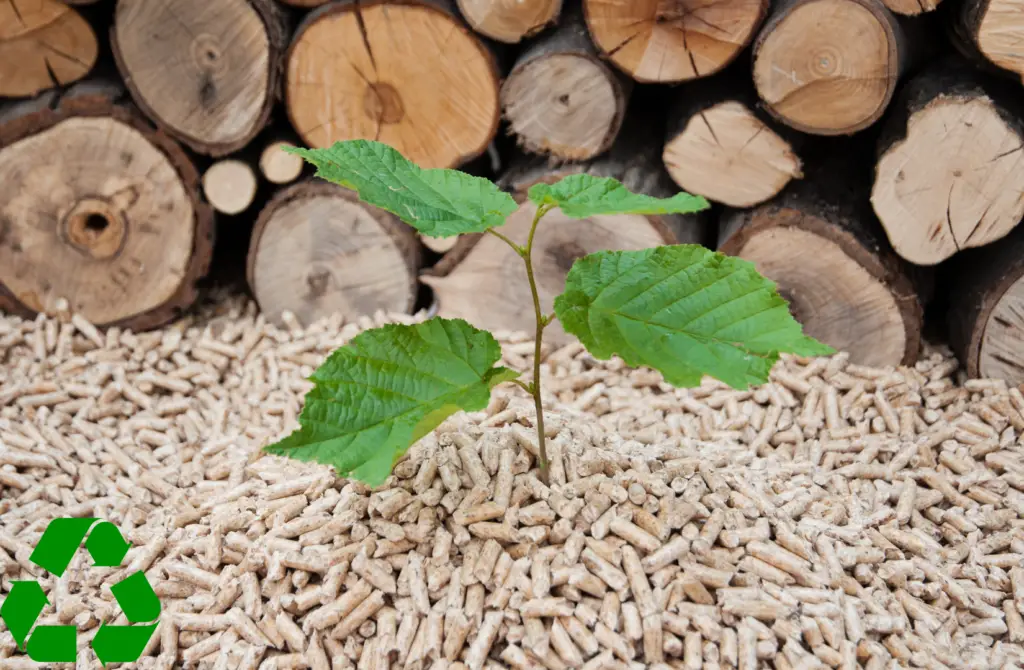Most heating systems, regardless of their benefits often have their downsides. One of things to consider is how environmentally friendly they are. Biomass systems combust biomaterials which may not be environmentally friendly in the long run, or are they?
Biomass heating is an environmentally friendly solution that has the potential to reduce emissions and help preserve the planet. It is a renewable energy source that can generate heat and electricity, and it is often seen as a more sustainable option than traditional fossil fuels.
It is important to note that the environmental impact of biomass heating can vary depending on the source of the biomass. Keep reading to learn more about Biomass heating systems and their ecological implications!

What fuels does Biomass Systems Use?
Biomass systems use organic materials, also known as biofuels, as a source of energy. The most common biofuels used in biomass systems include wood, crops, and waste materials. The most widely used biofuel for heating and power generation is wood, either in the form of logs, chips, or pellets.
We can use crops like willow, switchgrass, and corn to make biofuels. These crops are sometimes called energy crops since they are grown specifically for energy generation. Additionally, we can produce biofuels from waste products like municipal solid waste, forest residue, and agricultural waste. These materials are considered renewable resources because they would otherwise be dumped as garbage.
Additionally, You can transform biomass into alternative biofuels like biogas. Organic material breaks down under anaerobic circumstances to create this. Various users can now use this fuel to produce power or heat.
Bioethanol and biodiesel are two more types of biofuel that may be used as transportation fuels and are produced from plants like maize and soybeans. In general, biomass systems utilise a variety of organic resources, such as wood, crops, and garbage, as biofuels.

Are Biomass Boilers Sustainable?
Sustainable biomass boilers use biomass sourced sustainably and grown locally. Sustainably sourced biomass comes from well-managed forests and agricultural land, where biomass growth is balanced with the protection of biodiversity and ecosystems.
The boiler’s efficiency is also an important factor in the sustainability of biomass boilers. Modern boilers can reach up to 95% efficiency rates, making them highly efficient. This leads to the requirement of less fuel for producing the same amount of heat, which reduces the environmental impact.
However, if the biomass is sourced from deforestation or over-exploited resources, it can be considered unsustainable as it can lead to significant negative environmental impacts, such as loss of biodiversity and soil degradation.
To ensure that biomass boilers are sustainable, it’s important to consider the source of the biomass, the efficiency of the boiler, and the land management practices. Sustainably sourced and locally grown biomass should be used.
Is a Biomass System Good for the Environment?
Biomass is an excellent renewable energy resource that can provide numerous environmental benefits. It is a renewable, carbon-neutral energy source that can reduce greenhouse gas emissions and help mitigate climate change. Biomass can also help reduce the reliance on fossil fuels, which are finite resources and can help to reduce air pollution.
Furthermore, biomass provides economic benefits to communities by creating jobs and providing an additional source of income. Biomass systems can also help reduce waste by utilizing waste materials as a source of energy.

Is a Biomass System Bad for the environment?
Improper management of biomass can have negative effects on the environment. Burning biomass emits carbon dioxide and other pollutants into the atmosphere, which can contribute to climate change and air pollution. Additionally, Unsustainable sourcing of biomass can lead to biodiversity loss.
The harvesting of biomass materials can also lead to deforestation and soil erosion. Therefore, responsible management of biomass is crucial in minimizing environmental impacts.
Does Biomass Heating lead to Deforestation/Cutting Down trees?
Biomass heating has been a topic of debate in recent years. This is due to concerns about its impact on deforestation. Using biomass as a renewable energy source can provide many benefits, but it is important to consider the potential negative effects on forests and the environment.
One main concern with biomass heating is the potential for deforestation to meet the demand for fuel. Unsustainable biomass sourcing can result in natural forest clearcutting and wildlife habitat destruction. Monoculture tree farms as a source of biomass can also lead to the loss of biodiversity and natural forest ecosystem services.
Biomass heating can be sustainable if we source it from well-managed forests or agricultural and forestry residue and waste. Additionally, harvesting fast-growing species like willow or poplar on a short rotation basis can be an option.
As a result, we can harvest and replant trees within a relatively short period of time.
It is important to note that this approach can help in ensuring the sustainability of biomass heating.
Can Biomass Generate Electricity?
Organic matter such as wood, plants, and waste can convert into electricity by biomass conversion. Some of the methods for generating electricity with biomass include the following:
- Thermochemical Conversion:
Thermochemical conversion is one of the ways to generate electricity through biomass.This process involves burning biomass to produce steam, which drives electrical turbines to generate electrical energy. . The boiler burns biomass to produce high-pressure steam.
The high-pressure steam powers the turbine, which in turn generates electricity.

Coal power plants usually co-fire biomass with coal. This helps to reduce the amount of Greenhouse gases emitted and eases the demand for coal.
- Biochemical Conversion:
Biochemical conversion is a process that can convert biomass into electricity. This involves breaking down the biomass into gasses such as methane or ethanol and then using these gases to generate electricity.
Biomass-based power plants are relatively small and can provide electricity for small communities or industrial facilities. Larger power systems can integrate them and provide baseload power. However, it’s worth noting that the efficiency of converting biomass into electricity is lower than that of fossil fuels. It greatly depends on the type of biomass and the conversion technology used.
There is also the potential to generate electricity from other forms of biomass, such as agricultural waste, food waste, and forestry residue. Anaerobic digestion can convert these forms of biomass into electricity. Microorganisms break down biomass into methane, which can then generate electricity.
Conclusion
Biomass heating systems are environmentally friendly systems. This is because they help to ensure a net-zero carbon environment. It is a renewable energy source that ultimately helps to reduce carbon emissions by reducing the reliance on heating systems with carbon output.
It also emissions helps mitigate climate change. Biomass can also help reduce the reliance on fossil fuels, which are finite resources and can help to reduce air pollution.
Also , biomass provides economic benefits to communities by creating jobs and providing an additional source of income. Biomass systems can also help reduce waste by utilizing waste materials as a source of energy.
Poor management of biomass heating systems can harm the environment.It can lead to deforestation which can lead to climate change.
To prevent this, we need to ensure that we manage the resources well.


